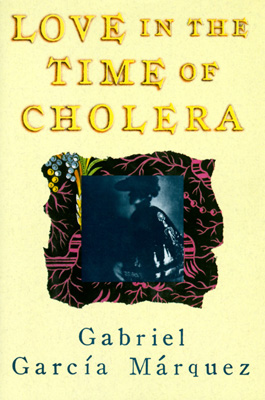
Subscribe to:
Post Comments (Atom)

You're Love in the Time of Cholera!
by Gabriel Garcia Marquez
Like Odysseus in a work of Homer, you demonstrate undying loyalty by
sleeping with as many people as you possibly can. But in your heart you never give
consent! This creates a strange quandary of what love really means to you. On the
one hand, you've loved the same person your whole life, but on the other, your actions
barely speak to this fact. Whatever you do, stick to bottled water. The other stuff
could get you killed.
Take the Book Quiz
at the Blue Pyramid.

You're Infinite Jest!
by David Foster Wallace
While you1 consider yourself2 to be clever,
there are those3 who think you're just full of yourself or, perhaps worse,
playing a joke4 on everyone around you, and yet you are pretty sure that
you really are that brilliant after all, since people would hardly take the time to
get to know you5 if they didn't care very deeply about what you had to
say to them, to wit, about their lives, their hopes, their dreams, their fears, their
drug habits, and of course what videos6 they prefer to watch, since,
after all, your impressive vocabulary and tendency to go on and on7 makes
you seem superior, able to educate them, and really drive a sense of something
ineffable into their measly little skulls while you are not above making a cheap
gag or really going after anyone or anything or telling them about incredible
futures involving tennis, geopolitics, and
1Meaning you personally, not someone like you or your own
personal daddy, for example.
2As well as you can see yourself, which, frankly, may not be that well.
3Though we wouldn't deign to be so peripatetic as to name them here, mind.
4Jokes, though not common in Victorian England, were known to originate
sometime in ancient history, perhaps as early as the time of Babylon, or even before.
It is thought that the history of the joke plays an integral role in the mindset of
the characters depicted here, though you may disagree at this point, in which case I
am facing quite the dilemma in relaying this narrative, no?
5It is rather time consuming, after all.
6Ha!
7and on and on and on...
Take the Book Quiz II
at the Blue Pyramid.

You're The Metamorphosis!
by Franz Kafka
Though you think you're in the midst of a dream, the fact of the
matter is that your life has become a nightmare. The nightmare at first seems
horrific to you, but you are slowly able to adjust to the facts of the matter
and settle down and make do with what you've been given. There are those that
would say you're pointless and absurd, but you're really just trying to
demonstrate that people can (and do) adapt to anything, no matter how absurd
it is. Not that this will really inspire them to change, because they probably
don't understand.
Take the Book Quiz II
at the Blue Pyramid.

8 comments:
Astonish Yourself! 101 Experiments in the Philosophy of Everyday Life by Roger-Pol Droit
No. 9 Hurt Yourself Briefly
Duration: a few seconds
Props: none
Effect: back-to-earth
You are bored. The play is interminable. The lesson is without interest. Or you're waiting for a phone call that doesn't come. Or you don't know what to do next, and you are in two minds. The world is veiled in a kind of mist. You feel you are becoming inconsistent yourself, as if your substance had begun to lose definition and to spread out vaguely all around you. As if you are becoming increasingly vaporous, milky, and weightless. You no longer know exactly who you are, or where you are. Boredom has started to dissolve you.
Pinch yourself. Hard. Where it really hurts. The inside of your arm, your neck, or your groin. The pain caused must be brief, but intense. Enough to make you utter a cry, which you may well have to smother. To outwit your defense mechanisms, act quickly, Allow yourself no time to anticipate or prepare for the pain. Be sudden. Try to take yourself by surprise, so to speak. Do everything in your power to hide your intentions. The pain must traverse you as though by accident, like a sudden collision. It must descend on you, like a lightning flash in the middle of the torpor of the day.
If you are sufficiently violent, the effect is certain: you recover reality, your body is returned to you, you know where you are, the mist dissipates, you emerge from your boredom, you return to the world.
http://pitchfork.com/reviews/albums/12751-frontier/
Just one question remains, which you should ponder: why should the experience of pain return us to reality? Is it a simple reminder? The effect of contrast? Or have we, in the course of our millennia, created such a way of life for ourselves that pain has become the first symptom of the world? A piercing question.
Agatha Christie's Death on the Nile: a Hercule Poirot Mystery, a Bantam Book, 1965:
"Then may I order you a lemon squash, Madame?"
He gave the order--one lemon squash and one Benedictine.
The swing door resolved. Rosalie passed through and came toward them, a book in her hand.
"Here you are," she said. Her voice was quite expressionless--almost remarkably so.
"Monsieur Poirot has just ordered me a lemon squash," said her mother.
"And you, Mademoiselle, what will you take?"
"Nothing." She added, suddenly conscious of the curtness,
"Nothing, thank you."
Poirot took the volume which Mrs. Otterbourne held out to him. It still bore its original jacket, a gaily colored affair representing a lady, with smartly shingled hair and scarlet fingernails, sitting on a tiger skin, in the traditional costume of Eve. Above her was a tree with the leaves of an oak, bearing large and improbably coloured apples.
It was entitled Under the Fig Tree, by Salome Otterborne. On the inside was a publisher's blurb. It spoke enthusiastically of the superb courage and realism of this study of a modern woman's love life. "Fearless, unconventional, realistic," were the adjectives used.
Poirot bowed and murmured, "I am honored, Madame."
As he raised his head, his eyes met those of the authoress's daughter. Almost involuntarily he made a little movement. He was astonished and agrieved at the eloquent pain they revealed" (48-49).
LYRICS:
I wake up every morning
I hear your feet on the stairs
You're in the next apartment
I hear you singing over there--
This groove is out of fashion
These beats are 20 years old
I saw you lend a hand to
The ones out standing in the cold--
Strange Overtones
In the music you are playing
I'll harmonize
It is strong and you are tough
But a heart is not enough-
Put on your socks and mittens
It's getting colder tonight
A snowball in my kitchen
I watched it melt before my eyes--
Your song still needs a chorus
I know you'll figure it out
The rising of the verses
A change of key will let you out--
Strange overtones
Though they're slightly out of fashion
I'll harmonize
I see the music in your face
That your words cannot explain
Strange Overtones
In the music you are playing
We're not alone
It is strong and you are tough
But a heart is not enough--
http://www.everythingthathappens.com/
http://www.youtube.com/watch?v=6DQyusKTAh4
No, this is not the building anticipation to hurt you. I just know that there are conditions you did not accept in the past, and have no intention of accepting now. Not triads; there is nothing like that.
XX is for judgment, and being clearminded for all counts, not his sonnet of triangulation.
https://books.google.com/books?id=4eIxBQAAQBAJ&pg=PA219&dq=roberto+calasso+berthe+morisot&hl=en&sa=X&ved=0ahUKEwicn4qUtNTqAhVSba0KHVi-BlgQ6AEIKTAA#v=onepage&q=roberto%20calasso%20berthe%20morisot&f=false
https://www.google.com/books/edition/Deliver_Us_From_Evil/bpPsZ-l4dWAC?hl=en&gbpv=1&dq=shulamite%20infidelity&pg=PA215&printsec=frontcover&bsq=shulamite%20infidelity
I will put Exercise 88 here.
https://1drv.ms/u/s!AsA4BY25Ql_1mH65lYuV9uQ7LT-U
On Patrick Hamilton's Rope (1929):
"Man is a rope, fastened between animal and Superman - a rope over an abyss."
Nietzsche's Thus Spake Zarathustra (1883)
https://books.google.com/books/about/The_German_Gita.html?id=cRXKAgAAQBAJ&printsec=frontcover&newbks=1&newbks_redir=0&source=gb_mobile_entity
Post a Comment